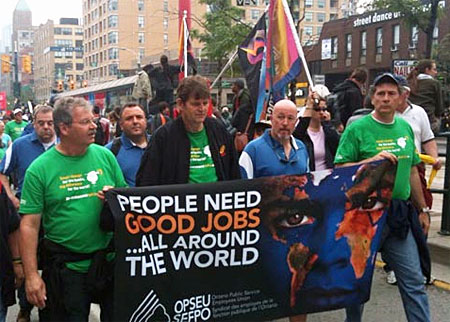This is an archive of news stories and research from the National Union of Public and General Employees. Please see our new site - https://nupge.ca - for the most current information.
(5 July 2010) - 'The big winners were the same financial institutions responsible for the economic crisis in the first place. Rather than seize the opportunity to act, the G-20 leaders failed to agree on any new regulations for the financial sector.' - James Clancy.
Updated with video.

By James Clancy
National Union of Public and General Employees (NUPGE)
Ottawa - The G-20 leaders have left and the fences have been torn down. The media coverage focused attention on the alarming costs for security and the clashes between police and protesters. There should be a public inquiry into these matters. Another important question that still remains is this: what did the leaders actually accomplish at the summit?
Surely our world leaders would fashion a plan to fix the still-ailing global economy, help people find jobs, support families and assist seniors whose retirement savings have been hammered. But no, the G-20 summit accomplished nothing in any of these areas. The big winners were the same financial institutions responsible for the economic crisis in the first place. Rather than seize the opportunity to act, the leaders failed to agree on any new regulations for the financial sector.
 |
| James Clancy, second from left, at G-20 summit. |
Moreover, Canadian Prime Minister Harper lobbied hard to kill an international Robin Hood tax on financial transactions that would discourage harmful speculation and generate billions to fight poverty, tackle climate change and fund public services around the world. He did so despite the fact that Canada’s banks are immensely profitable and could easily absorb a small tax.
On the single most important challenge the leaders faced – developing public policies to tackle growing income inequality, which was the root cause of the economic crisis – the G-20 leaders said virtually nothing of substance. In fact, it was worse than that. The only decision of significance they made will actually serve to exacerbate the problem of income inequality.
Following Harper’s rigid free market ideology, the G-20 leaders agreed to cut deficits in half by 2013. Most economists agree that in order for a country to get through tough times it’s imperative to save in the good times so that when the bad times come you’ve got the money to stimulate the economy. Canada was in relatively good shape heading into this crisis, having built up record surpluses and paid down public debt over the last decade. But let’s not forget that Canadians paid a huge price to be in this position with serious cuts to our social safety net.
Now is exactly the time for the Canadian government to be spending in order to keep our economy afloat and to help vulnerable families. But the G-20 promise to cut deficits sets in motion the very rush to the exits that most economists say is a danger to economic stability and growth around the world. After all, when you're starving, you don't go on a diet!
If carried out, the G-20 promise is a reckless decision and we should be clear who will pay the price – again. Massive cuts in government spending will push the world back into a global recession with even more people losing jobs. Such brutal government belt-tightening will mean longer wait times in emergency rooms; students will face higher education costs; young kids will have fewer spaces for early learning and child care; and pensioners will face a more insecure retirement. Income inequality is going to get a lot worse in the years ahead as a result of the decisions made at this summit.
One of the most embarrassing and sad spectacles of this summit was our prime minister being sensitive about inflicting “pain” on the financial sector in the form of regulations and taxes while at the same time leading the charge for deficit reduction measures that will impose real hardship on vulnerable families at home and abroad. In the end, Harper got what he wanted: corporate executives and financial institutions remain coddled while the poor and the vulnerable will pay the price through cuts to social programs and continued high unemployment.
We’re told that in times of turmoil great leaders emerge and display the courage to set aside political agendas and ideology for the sake of the common good. Sadly, the G-20 leaders missed an historic opportunity to rise to the occasion and find real long term solutions to the world’s most pressing problem of income inequality. It’s hard to think of anything more alarming.

James Clancy
National President
NUPGE
James Clancy is the national president of the National Union of Public and General Employees (NUPGE), one of Canada's largest labour organizations with over 340,000 members. Our mission is to improve the lives of working families and to build a stronger Canada by ensuring our common wealth is used for the common good. NUPGE
